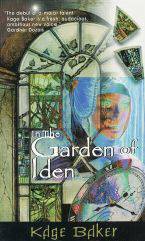

| Kage Baker has her own Web page. | ||
| Click on a book's image or title to order from Amazon.com |

In The Garden of Iden
Avon/EOS, PB, © 1997, 313 pp, ISBN #0-380-73179-7Reviewed June 2000
In the Garden of Iden starts with a tasty premise told in lively short form which should entertain (for instance) fans of the "Deliverator" teaser in Neil Stephenson's Snow Crash: In the 24th century, a company called Dr. Zeus has made two key inventions: One is the ability to make people immortal by performing biological and structural surgery on them as children (i.e., they become immortal cyborgs with the proverbial powers beyond those of mortal men), and time travel. Now, time travel is restricted by physical law: You can only travel to your past, and return to your present; you can never travel to your future. And, you can't change recorded history. The key being recorded history; you can do whatever you can get away with to history which is not remembered.
And gee, you know how paintings and documents from the past sometimes seem to turn up in someone's attic? Well, what if you could actually arrange such things? Dr. Zeus does - dramatically. And they create an organization of immortal cyborgs in the past who are indoctrinated to serve them.
The book's fatal flaw is thus introduced in the very beginning: It's not about any of that neat stuff. What it's about, is a woman named Mendoza who is rescued from the Spanish Inquisition by Dr. Zeus in the middle of the 16th century, turned into an immortal, and sent to England during the reign of Queen (Bloody) Mary to preserve rare plant specimens in the unique garden of Sir Walter Iden. While there, she falls in love with Iden's right hand man, Nicholas Harpole, who is an ardent Protestant who quietly fumes against Mary's efforts to return England to Catholicism.
You see the dilemma? There are all these questions left unanswered (questions which are, to my mind, more intriguing than the actual plot of the book): What happens when the cyborgs get to the 24th century? What is Dr. Zeus really up to (assuming - as seems likely - that they're not fully committed to the last man to their beneficial efforts to preserve elements of history)? What will happen to Dr. Zeus and the world in the decades after this technology has changed everything? But, as with David Brin's Startide Rising, the book isn't concerned with those issues, and the ending therefore feels disappointing.
(On the other hand, this book turns out to be the first in a series - there are two sequels as I write this - so maybe we'll eventually find out. There's also the question of the identity of the individual who sets up Mendoza to be rescued, although the answer seems rather obvious to me. But read it for yourself.)
In the Garden of Iden is at its core a fairly straightforward story: Mendoza falls hopelessly in love with this attractive, intelligent and (for his time) forward-thinking man, who nonetheless is in opposition to the ruling regime, and isn't nearly forward-thinking enough to cope with what Mendoza actually is. So the plot ends up as a traditional sort of tragedy (with some science fiction thrown in).
There is intrigue at the home of Sir Walter, involving the leader of the immortal band, Joseph, using future science to rejuvenate Iden, which leads to understandable changes in Iden's behavior and outlook, thus changing the parameters of their mission. The three immortals in the group do not entirely get along, which leads to a series of small adventures. And, Mendoza gradually grows from a sheltered young woman who loathes the idea of working with mortals into someone with an appreciation for the world around her, and exposure to the full range of her emotions. In short, she starts growing up.
Baker's writing is sharp, and often wry and witty, which does much to make up for the somewhat disappointing plot. Her characters are well-drawn, as is the background against which the story is set. (The modern-style radio broadcasts reporting events during Mary's reign are priceless!) The book has been applauded from many quarters, but I could never quite get past my feeling that this wasn't the story I really wanted to be reading here. I'm willing to read the next books, but I don't think this premise has the potential to become an extended franchise like Lois McMaster Bujold's Vorkosigan books do. Ultimately, Baker's going to have to give us the 24th century payoff, and I doubt I'll be willing to read more than about five or six books to get there.

Sky Coyote
Avon/EOS, PB, © 1999, 292 pp, ISBN #0-380-73180-0Reviewed July 2001
Sky Coyote does everything right that its predecessor, In The Garden of Iden doesn't: It has a witty narrator, it presents its historical setting in a manner both more lively and more unusual, and best of all, it gives us some great looks at the society of Immortals that the future company Dr. Zeus has created to help enrich its own world in 2355.
Facilitator Joseph was Mendoza's rescuer and companion to England in the first book, and he's the narrator here. Himself elevated to his role in the Stone Age, Joseph is one of the oldest of the Immortals, and he's got a sense of humor. The year is 1699, and Joseph returns to New World One, the Immortal facility in the center of South America where he again meets his protege Mendoza, who has spent the last century living in the city and working on her own projects, far from thoughts of England, her lover there, or the world of Mortals. But Joseph has returned to get his new assignment, and he's taking Mendoza with him.
Off they go to the California of 1700, where they are to rescue - en masse - a village of the Chumash people, an American Indian tribe which used money and lived comfortably and wealthily among their contemporaries until the coming of the Europeans. The main obstacle to their plan are, in fact, the administrators from Dr. Zeus sent from the future to oversee the project. Pampered and sheltered, these future Mortals are repulsed by the Immortals and the time period, and seem mostly incompetent, hardly the sorts who would have spearheaded the Dr. Zeus project.
Joseph heads the Chumash mission, augmented as their god Sky Coyote, the one god who sticks up for humanity, and he tells them that he's come to save them from the white men who are to destroy them, and will take them off to a better world.
Joseph is a lively and wry narrator who carries the book all by himself. His observations of how New World One are often quite entertaining, as is his outlook on being dressed up as Sky Coyote and dealing with the Company flacks overseeing the mission. The mission itself is fun because the Chumash are presented as having savvy usually associated with modern, American attitudes: They use modern slang, use modern methods of controlling production to raise prices, understand the difference between wholesale and retail (the concept of a "Spirit Who Buys At Retail" is one of the funnier notions in the book), and yet still have what seem like traditional religious concepts and ceremonies. Just because they were - by our standards - living in primitive conditions, doesn't mean they were dumb, and for all the horsing around that occurs in the book, they're treated respectfully as characters.
But the most satisfying moments involve Joseph's views into Dr. Zeus itself. Surely these oafs who "oversee" this mission can't be running things? So who is, up there in 2355? The Immortals? Mortals they haven't seen? And Joseph reminisces about his own history, and his mentor Budu, who disappeared - along with many other older Immortals - sometime in the last 1700 years. What happened to them? They're Immortals, so presumably they weren't killed. At last we get an idea of what's at stake, and some of the possibilities of what happens between these novels and 2355.
While Iden was a fairly dreary novel, Sky Coyote makes up for it. I'm sorry it took me a year to get around to reading it, and I'm looking forward to reading the next one.

Mendoza in Hollywood
Avon/EOS, PB, © 2000, 365 pp, ISBN #0-380-81900-7Reviewed September 2001
The third installment of Baker's Dr. Zeus series advances the story, but isn't as good as Sky Coyote, overall, largely because of its haphazard plot, and the fact that it returns to Mendoza as narrator. It's still an enjoyable book, though, and drops some hints that will keep me reading the series.
Botanist Mendoza travels from northern California, where she's been happily doing her job in isolation for the last 160 years, to the Hollywood of 1862. There isn't a lot there in 1862; Los Angeles is wild and untamed, and everyone is armed. A small enclave of Company immortals are operating a stagecoach way station and going about their duties of gathering physical and sociological evidence of their time and place. Mendoza is not happy at having to work with others, especially since the area is about to get hit with a nasty drought which will wipe out much of the life in the area, leaving her without much to do.
Her comrades include: Porfirio, who was rescued with his brother by Dr. Zeus and who has been keeping tabs on his brother's Mexican descendents ever since; Einar, an eccentric security tech and film buff; Oscar, who's gathering data about the area by acting as a travelling salesman, but who isn't really pretending; Imarte, an older and voluptuous female cyborg who's collecting anthropological data using her cover as a whore; and Juan Bautista, a teenaged immortal who's rescuing and collecting endangered birds, and perhaps getting too attached to them.
The book mainly consists of vignettes: Juan Bautista's collecting. An unexpected encounter with Porfirio's family. Einar ordering some yet-to-be-made silent films and showing them. Oscar's quest to sell a fancy pie safe. And a brief detour through a very unusual canyon resulting in a surprising development in the lives of Einar and Mendoza. But ultimately the book focuses on a conspiracy running up the California coast, which Imarte discovers, but which ropes Mendoza into a peculiar web of intrigue beyond anything she'd imagined.
As you might imagine from that, Mendoza in Hollywood is not tightly plotted by any means, and indeed the strongest plot thread of the book doesn't rear its head until more than half-way through, when Imarte discovers the plot. The book doesn't involve the main characters on a particular quest; they're just sitting around doing basic collecting, not trying to achieve any particular goal, which lessens any sense of urgency that the book might have. (If there's one thing that In The Garden of Iden got right, it's a sense of pressure hemming in our heroes.)
Mendoza also continues to be a rather dull character. Unlike Joseph's narrative in Sky Coyote, which was lively and wry and funny, Mendoza's sense of humor is dry and sardonic, at best, and her tone is generally a fatalistic one, interlaced with whining about her dead mortal lover from Iden. She dislikes herself and her fellow cyborgs, and therefore has little interesting to say about anything around her unless she's forced into it by the sheer urgency or strangeness of developments. Or, at least, it feels less interesting when she says it.
Happily, this is counterbalanced by her lively and amusing supporting cast. Porfirio successfully mixes pathos with a sense of humor, and ends up having the most moving story in the book. And although I was disappointed that Mendoza and Imarte didn't get along, Imarte comes closest to exhibiting Joseph's sense of humor, albeit with a much sharper edge (ironic, since she and Joseph can't stand each other). Oscar's exuberance lightens the book considerably, and Juan Bautista's coming-of-age is tinged with sadness. Only Einar isn't really very successful, as his presence leads to an interminable viewing of D.W. Griffith's film Intolerance (1916), which is as tedious and annoying a chapter as you'll find in science fiction literature. If ever a book needed an editor, this one needed one to excise this whole chapter!
Ultimately, the book winds up with the conspiracy plot, and a startling and not-entirely-believable visitor to Mendoza's life cut the development some slack since I suspect much will be explained in future books). Aside from an interesting glimpse into California shadow-history, this results in our seeing the results of what Joseph only hinted at in Sky Coyote, and some new information about the nature of Dr. Zeus being presented to us. Although the vehicle of presenting this information could have been better (at the least, it could have been better woven through the whole story, rather than crammed into the end), it's still tantalizing as it is.
So, as an installment of a series, Mendoza in Hollywood is fairly successful, but it's not a terrific book on its own, though it does have many high points. I look forward to the next book, which I understand will not have Mendoza in it (at least, not prominently).
hits since 13 August 2000.